Graduate Fellows
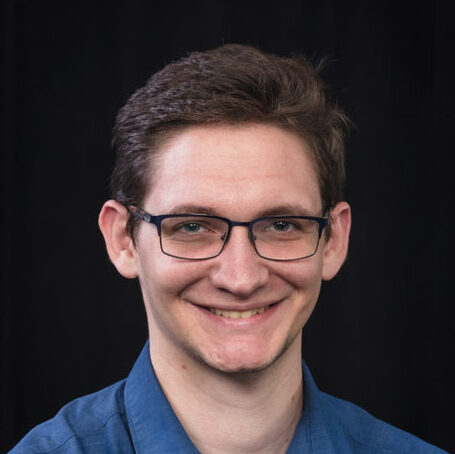
Matthew deJong
My name is Matthew deJong. I am beginning my third year in graduate school at North Carolina State University (NCSU). I am pursuing a PhD in Materials Science and Engineering while performing research in Nuclear Engineering.
As a fellow of the Nuclear Science and Security Consortium (NSSC), my doctoral research is focused on the characterization of additively manufactured (AM) materials. I am researching how the microstructure of oxide dispersion strengthened (ODS) steel synthesized via Laser Powder Bed Fusion (LPBF) is influenced by changes in the preceding metal powder. This powder is produced through gas atomization reaction synthesis (GARS) in batches of varying chemistries. ODS steel is a potential candidate in the nuclear industry for structural applications in high temperature environments under radiation exposure. The ability to produce complex geometries through LPBF reduces the need for joining processes which can impact the microstructure at the weld and weaken the material.
During the summer 2023, I interned at ORNL under the mentorships of Dr. Chad Parish and Dr. Holden Hyer. Both of my mentors have been extremely welcoming and have helped me gain a better understanding of both the processing and characterization sides of additive manufacturing. I have been taught how to print samples through LPBF, as well as how to characterize the grain structure of samples through Transmission Kikuchi Diffraction. Although I have had a lot of experience in Transmission Electron Microscopy at NCSU, my mentors are showing me new ways to improve data collection, both in terms of sample preparation and while using microscopic instruments.
While the internship has provided me with data useful for my dissertation, it has also enhanced my knowledge of sample preparation and has helped me become a better microscopist. I have enjoyed my time at ORNL. I have seen how different the work environment is at a national lab compared to academia. For example, at a national lab I can characterize samples for a day at a time and generate large amounts of data to enhance my research. This combined with the extensive collaborations with numerous experts across many disciplines makes me understand why national labs are able to produce impactful research. Towards the end of my bachelor’s degree, I decided that I wanted to pursue a career in research. ORNL has shown me firsthand that a career in research on structural materials is achievable for me and is something I earnestly look forward to.
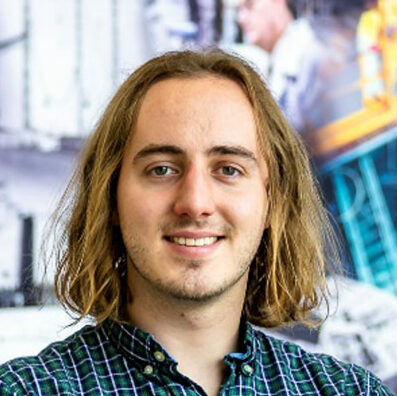
Lance Drouet
My name is Lance Drouet. I am a fellow of the Nuclear Science and Security Consortium (NSSC) and a Ph.D. student in Nuclear Engineering at the University of Tennessee, Knoxville. My doctoral research is focused on investigating the use of Artificial intelligence (AI) and Machine learning (ML) techniques on nuclear data and data generated from simulated low-fidelity models to improve the optimization of nuclear system design.
During the summer of 2023, I interned at ORNL under the mentorship of Dr. Rike Bostelmann. While at ORNL this summer, I was given the opportunity to work with the developers of SCALE (Standardized Computer Analysis for Licensing Evaluation), which is a comprehensive modeling and simulation (M & S) suite for nuclear safety analysis and design; and which has been developed and maintained by ORNL under contract with the U.S. Nuclear Regulatory Commission, U.S. Department of Energy, and the National Nuclear Security Administration. The tool performs reactor physics, criticality safety, radiation shielding, and spent fuel characterization for nuclear facilities and transportation/storage package designs to quantify the effects of nuclear data uncertainties on spent fuel metrics. I was fortunate to work directly with the SCALE developers to improve the end-user experience and, in the process, observe firsthand the software development life cycle for this major M & S suite of tools.
My internship at ORNL has contributed to my doctoral research by connecting the concept of nuclear data uncertainties, uncertainty quantification (UQ) in M&S, and the importance of these metrics towards real applications. I found ORNL’s diverse and welcoming environment to be instantly conducive to nurturing my curiosity, technical capabilities, and personal growth. The connections and knowledge I have gained throughout the summer have built my confidence in my career prospects and in continuing my Ph.D. research.
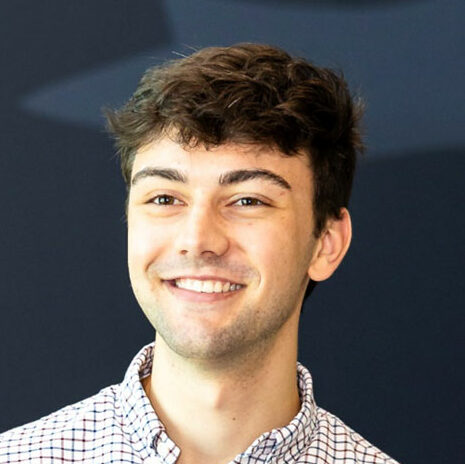
Brad Nethercutt
I am currently a PhD candidate in nuclear engineering at Penn State University and have been a member of the Monitoring Technologies and Verification (MTV) Consortium since 2021. My thesis research focuses on utilizing an epithermal neutron chopper system at the Penn State Breazeale Reactor to identify new signatures for nuclear forensic characterization through neutron activation analysis.
As an ORNL intern during the summer of 2023, I worked under Dr. Vincent Jodoin within the Incident Modeling and Computational Sciences Group on a verification and validation effort of Water Surface Burst, a nuclear fallout simulation code. Before this internship, I had very little introduction to the post-detonation side of nuclear forensics. Now, having hands-on experience using several tools developed at ORNL in pursuit of the NNSA’s nuclear forensics missions, I can say that this experience has uniquely broadened my knowledge of the field.
My internship provided a great opportunity to network with ORNL scientists and get their insight on their career paths and what drew them to Oak Ridge. Everyone I spoke to was eager to answer my questions. I was very impressed by the breadth of work being done at ORNL, both within the Nuclear Nonproliferation Division and elsewhere. As I look beyond graduation, I am excited by the prospect of returning to ORNL to begin a career in nuclear forensics.
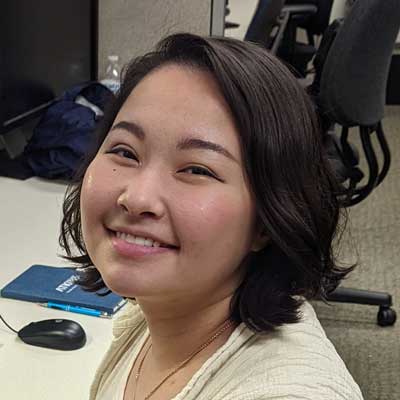
Dinara Ermakova – UC Berkeley PhD Student (NSSC Fellow)
During the summer 2022, Dinara interned in the ORNL Nuclear Energy and Fuel Cycle Division working under Drs. Andrew Worrall and Jin Whan Bae. Dinara’s research was focused on the electricity generation sector which is responsible for 25% of the world’s greenhouse gas (GHG) emissions and thus has been the focus of efforts to transition to clean energy and sustainable development in many nations. According to Dinara’s research, the rapid development of renewable energy sources and technologies will require an enormous amount of raw materials to replace coal and gas plants and increase in the capacity to handle growing electricity demand because renewable energy sources have a low-power density and intermittent behavior. During her internship, she was explored the opportunity for remining abandoned mines waste as a way to satisfy demand, facilitate cleanup activities, and engage local communities. The results of her work will be published in a technical report. In addition, Dinara was able to work on her dissertation project, assessing the material demand for the projected transition and its transportation carbon footprint. Apart from work, Dinara says, she that her internship provided the opportunity to meet “many brilliant people and make friends at the Lab.
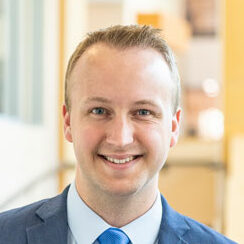
Jordan Stomps – University of Wisconsin-Madison (ETI Fellow)
Jordan is a doctoral student at the University of Wisconsin-Madison studying nuclear engineering under Paul Wilson. He began his internship at ORNL in May 2022 to develop and expand his doctoral research. His research is supported by the NNSA Consortium for Enabling Technology and Innovation (ETI) under the Research Thrust Area for Computer and Engineering Sciences for Nonproliferation. His doctoral research utilizes data collected under the NNSA NA-22 MINOS project in collaborations with ORNL research scientists (Jared Johnson venture lead; Ken Dayman team lead).
Jordan’s research focuses on leveraging large volumes of radiation-detection data (i.e. gamma-rays) that have limited attribution. In real-world scenarios, the high cost of limited contextual and ground truth information can make labeling sufficient data prohibitive. Using semi-supervised machine learning techniques, Jordan is designing methods that can increase the amount of high value, interpretable, and actionable information relevant to a range of nonproliferation missions. This ultimately leads to more informed decisions and resource efficiency based on nuclear monitoring.
By working with ORNL researchers, Jordan has been able to align his research with impactful applications to help further NNSA’s nonproliferation objectives. In addition to having a network of expertise on nuclear nonproliferation, Jordan’s research is also being supported by ORNL’s scientific and computing resources which are critical tools for research in machine learning and artificial intelligence applications. Jordan hopes to complete his PhD while at ORNL; and hopes to use this experience to build a career in nuclear nonproliferation research.